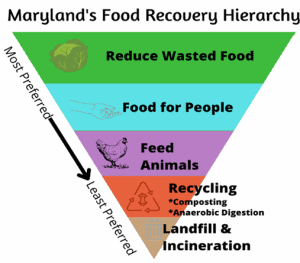

The Maryland Department of the Environment (MDE) reminded all stakeholders that enforcing the state’s new food diversion regulations begins April 1, 2023. The law governing these regulations, entitled “Solid Waste Management – Organics Recycling and Waste Diversion – Food Waste,” was enacted on January 1, 2023.
Diversion reduces waste at final disposal sites, such as landfills and incinerators. Food residuals include edible and nonedible materials derived from pre- and post-consumer vegetables, fruits, grains, dairy products, and meats.
A facility must implement food diversion techniques if it generates at least two tons of food residuals per week. Affected facilities include businesses, public and private schools, supermarkets, and government-run cafeterias.
SCS Engineers advises facility owners and operators to review MDE’S Determination of Applicability to determine if they are subject to enforcement. MDE strongly recommends that facility owners and operators submit a Waiver Application Form if they believe they are not subject to enforcement or cannot comply with the regulations.

Maryland generates an estimated 1.86 million tons of compostable materials and 927,926 tons of food waste annually. Although a major waste component, only a small amount is reused or recycled. What remains ends up being disposed of in landfills or incinerated. Diverting edible foods can help address the 1 in 8 (12.5%) food-insecure Marylanders. Preventing food scrap and organics disposal using methods such as composting or donating to those in need conserves energy and resources, and reduces greenhouse gas emissions.